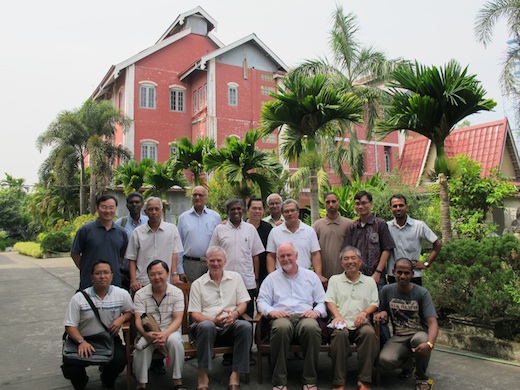Many may have thought the battle won when Aung San Suu Kyi was free to appear in public, when hundreds of political prisoners were released, when dissidents were free to return home from exile abroad, when censorship and sanctions were lifted, when elections were held, and as parliament sits to draft a new constitution. In reality the work of rebuilding Myanmar is just beginning.
After half a century of brutal mismanagement and appalling leadership, myriad resentments simmer. Decades of neglect in education, health care, social welfare, and infrastructure cannot be overcome in an instant. As the dictatorship eases control on its own citizens, people seize the opportunity to protest the injuries and injustices they have suffered. As self-expression becomes more common, powerful ethnic, religious and cultural frameworks are evident, and fanaticism, racial disagreements, and old envies are rehearsed.
The treatment of the Rohingya, the response to the escalating attacks on Muslims in Myanmar, the capacity to achieve a peaceful settlement in the Kachin war, the ability to find harmony among many ethnic and racial groups, will test not only the new Myanmar regime of Thein Sein, but also its newfound friends, the many countries and companies now enjoying a honeymoon of new investment possibilities in the country. In this context, new social restraint, new skills of negotiation, new efforts for building community and for protecting the environment are sorely needed.
The Church in Myanmar is awakening to new opportunities and challenges. With few public services apart from seminaries and kindergartens, and a history of necessary isolation from authorities and other religions, the Church begins to learn to take its place in civil society. Now Church leaders have opportunities to develop friendships and trust, and to negotiate across many sectors of society.
The challenges for the Myanmar Jesuit Mission in this context are also great. It is possibly too early to build institutions, but not too early to invest in people and their formation. Recently the mission hosted a visit by a number of provincials for a consultation on how the universal Society might cooperate with and support the mission. They met with Church and civil society members who outlined developments, challenges and opportunities within Myanmar.
The consultation considered our services to the Church, outreach activities to Myanmar society, and internal issues such as formation and governance. The provincials were encouraging; they understood our goals and needs. The importance of finding qualified personnel, both for long and short term assignments, became clear. Promises were given for financial help, for support to a scholarship fund for our lay collaborators, for study opportunities for Jesuits, and for help in searching for resource persons such as educators, spiritual fathers and teachers in seminaries, and for formators of religious. Given the need to inculturate more deeply and to develop apostolic outreach in Burmese language, those being sent for long term assignments will normally be given time to learn the language. Even those on short term assignments, such as regents who come for two or three years, will have opportunities for language studies.
There are more than 30 Myanmar Jesuits in formation, many of them studying in the Philippines and Indonesia. Quite a number will come home this year for some years of practical immersion in service of their people. The challenging times ahead in Myanmar over the coming decades will require qualities of diverse skills, discernment, discipline and deep self-knowledge not just in them but in all who are committed to building community, capacity in the young and harmony in society.
As Easter breaks open with the new light and hope of dawn, please join in prayer and practical support for the fledgling Myanmar Mission in its service of a country now emerging from a long, dark night of isolation and oppression.
Mark Raper SJ
President, Jesuit Conference of Asia Pacific
March 26, 2013







